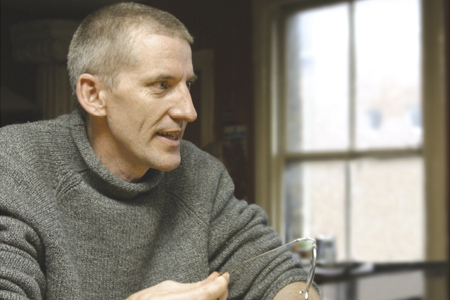
Table Talk with Clive Stafford-Smith
Issue 6 Jun / Jul 2004
First Published on July/August 2004
To access the issue page, click here
Clive Stafford-Smith is fired up. He is raring to talk about Guantanamo Bay. This becomes evident as soon as he sits and faces me. “Are you passionate?” he asks. “Are you as passionate about Guantanamo Bay as I am?” he challenges. It appears to me he’s also become Americanised. He pauses for a second before going on. “I am here because I want to get support for the coalition I am building against Guantanamo Bay.”
Words Sulaiman Abdu
Photography Maeve Tomlinson
I met Stafford-Smith, a human rights lawyer and activist, just a month afterthe British clients he represented (Shafiq Rasul and Asif Iqbal of the Tipton three) were released from Guantanamo Bay.
Stafford-Smith might be expected to be shocked by the American people’s response to his campaign against Guantanamo Bay.“I got more death threats over Guantanamo than I ever got campaigning against the death penalty.” But he is not shocked. Guantanamo Bay is still paramount on his campaigning agenda. “I quit doing death row for now because Guantanamo Bay is about a worse expression of injustice over lot of groups of people,” Stafford-Smith explains.
Stafford-Smith is a human rights lawyer and has lived for over 20 years in the USA fighting against the death penalty despite receiving countless death threats; despite being held seven times at gun-point; and despite his nostalgia for his country - clear when he says, “living in America mademe appreciate things about Britain I never thought I would.”
I start off by asking what he thinks of the Islamic Shari’ah law which favours the death penalty. “I don’t approve of the death penalty under any circumstances. It doesn’t make a difference to me if it is under Shari’ah law or under any other law. It is not right. To me it’s just like saying, “I like killing people.”
With regard to his views on Islam he says “what I like about Islam is its focus on the group, which is opposite to the West’s focuson individuality…” He checks himself before continuing, “although I dislike the exclusivity of the group in Islam.”
What about his religion? That answer is swift “I find it always an egocentric thing to worry about whether you are going to heaven. I will find out when it happens. But to spend your whole life on whether you personally are going to get the benefit of heaven seems a terribly selfish thing to do.”
I ask how he ended up fighting the death penalty in a place far away from home. “I wanted to be a journalist,” he recollects, “and so when I was 16 I was writing an article about the history of the death penalty. I discovered that the Americans were killing each other. So I thought of going there to stop it happening.” That was 20 years ago, but why did he stay there all this time? “Well, I thought everything would be fine in five years, and I would come home. But it has been a disaster.”Does he like living there? “No, I hate living there. I really can’t stand it. It is a society thatis so full of hatred of people. Everybody hates everybody else.”
Why? Stafford-Smith blames American politicians. “The American people are constantly told by their politicians to despise other people. The American Dream teaches people to hate poor people because they believe poverty is a choice. So, instead of seeing a poor person and feeling sorry for them, you see a poor person and you hate them.”
Stafford-Smith’s analysis is that “in the days of KKK they were teaching white people to hate black people - to make themselves feel better. And each generation that we [he uses ‘we’ as he holds American citizenship] have gone through, we came up with someone else to hate.” In the old days, Stafford-Smith says, there were black people, the 3,800 people on the death row, to hate. And now? “American politicians are inciting their people to hate Muslims. But when you hate a billion Muslims they hate you back. This makes theworld an extremely, extremely dangerous place.”
“Guantanamo Bay is about nothing elsebut hating people. I slightly disagree with Michael Moore [the American film maker and political activist] when he talks about the politics of fear. I don’t think it is fear. I mean, fear is one thing, you can fear people. It is about hate, and it is much more insidious when you hate people. The death penalty, Guantanamo Bay, and the new criminal legislation, all of these are about hating people.”
Is that why he got involved with Guantanamo Bay? “Well, when you look at Guantanamo, the issue is not about some lunatic terrorists – which of course they are not. Guantanamo achieves nothing to benefit anybody, but achieves an enormous amount as an iconic syndrome of hatred to inspire the rest of the world to hate the Americans. You know, I carry both British and American passports, and thanks to Tony Blair and George Bush these are dangerous things to carry. I resent that. I resent the fact that our politicians are trying to make the world hate each other. So we have got to stop them from doing that.”
I ask Clive if he can understand any of the American claims to be fighting for democracy and/or the UK’s government’s claim that the information gathered from the British detainees in Guantanamo Bay had led to the arrest of suspected terrorists in UK. In each case, Stafford-Smith’s dismissal is abrupt and backed with powerful rebuttals.“The Americans tell the world they are fighting for democracy and rule of law. And what is the first thing they do? They take a part of Cuba – a country America claims hasn’t the rule of law – and they incarcerate foreign detainees, deny them their basic rights and treat them like they are not human beings. And if that is not enough to inspire a total disdain around the world, I don’t know what is.”
And about the British government’s claim that evidence was gathered from the British detainees, “this is totally false. Any half decent interrogator will tell you that what Americans are doing in Guantanamo Bay is pointless. If you take people there, threaten them with the death penalty, and say that they can be released if they tell you something, I myself will crack up in less than a week and say anything. Why not?”
“The things the British government have said on this subject have been ‘terminologically inexact’ to quote Churchill. When they go publicly and say that these British citizens in Guantanamo are a threat to national security, you have got to be kidding me. I mean British national psyche is not very secure if we are threatened by a bunch of Muslims from Tipton.”
Stafford-Smith acknowledges “there are people who do tragic and foolish things, but I can understand why some people might be tempted to fight America. I myself was very angry about the American hypocrisy and how they treat prisoners at Guantanamo. So the war on terrorism is nothing but ‘America’s crusade against the Muslim world.’ The war on terrorism is part of America’s psyche of hating other people - itself institutionalised in the ‘American dream.’ But what about Britain? Why is Tony Blair so resolute in following George?
“Tony Blair and other British politicians are leading this country down the same path as America’s. And I don’t understand why a declining colonial nation like Britain can’t see that the only role it has in the world is to propagate decency, and not emulate the Americans. It is very depressing to see. But we have got to stop them from doing that.”
How can Muslims help? Stafford-Smith gets fired up again. “Look, it is wrong to think about Guantanamo Bay as just legal issues, because it is not. It is 90% politics, 5% law and 5% something else. The only court we have – since Americans are preventing civil trials for the detainees – is the court of Public Opinion. Guantanamo Bay is about the latest Western crusade against Islam. So we need Muslim lawyers to teach us Islamic law, to help us understand the people we are representing; we need linguists, as there are people from 44 countries in Guantanamo Bay; and we need journalists to help propagate the story.
We need to stand together and we will win,” he pauses, “and we are winning the PR battle. Remember, it’s the court of Public Opinion that you all have access to and you must utilise that.”
Bookmark this |
|
Add to DIGG |
|
Add to del.icio.us |
|
Stumble this |
|
Share on Facebook |
|
Share this |
|
Send to a Friend |
|
Link to this |
|
Printer Friendly |
|
Print in plain text |
|


Comments
0 Comments